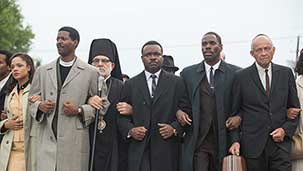Dear America,
Since the Oscar nominations were announced last week, the noticeable lack of diversity among the high profile nominees has become a huge controversy. “The whitest year since 1998!” has become a familiar lament. “Selma gets snubbed!” was a headline or sub-head in almost every single Oscar news item of the day. Hands were wrung—not just in self-righteous protest, but in disappointment over the dismissal of a beautifully accomplished film that could have used the boost in profile.
Selma being overlooked, however, feels less like an institutional crime than one of poor taste.
No one will deny that the Academy’s demographics don’t reflect the diversity of America. Neither do most of the films that Hollywood makes (not by a long shot). Clearly that needs to change. However, in nearly two decades, this is only the second time acting nominations went exclusively to white actors.
The disappointment of film fans seems to be focused on David Oyelowo and Ava DuVerany (two relative unknowns), neither of whom received one of the five slots coveted by every film actor and director in the world. It’s a missed opportunity, sure. Especially with such a legitimate chance to nominate (deservedly) the first female Black director. But when the nominees were announced last week, barely anyone had seen Selma. Yet everyone in the media (social and traditional) wasted no time in crying foul. The road to progress seems to lead, once again, to Selma—but maybe not in the way that most people think.
The fact the film was nominated in fewer categories than most of us would have liked might paradoxically be a positive sign. This feels like true equal-opportunity outrage, the kind everyone feels when their favorite film is ignored. But it doesn’t feel like an outrage about a lack of equal opportunity.
Last year, the unflinching drama 12 Years a Slave – directed by a Black Brit – took home Best Picture. And for the most part, black movie stars have been fairly represented at the Oscars for the better part of a decade. Jamie Foxx, Forrest Whittaker, Morgan Freeman, Lupita N’yongo, Octvia Spencer, Mo’Nique Imes-Jackson, Jennifer Hudson—all major winners in the last decade (representing 7 of the past 40 acting awards).
From an outsider’s perspective, things don’t necessarily look so grim. At the same time, however, it's understandable how it might feel like a step backward. Particularly in a year when racial inequality has led to some truly ugly moments. Especially when Selma felt so timely, so worthy. But isn’t it possible that accusations of institutional racism are overblown in the exact same way that accusations were of quota-filling from last year? Isn’t the odd all-white year of actors (say, once a decade) kind of statistically inevitable? Is DuVernay really so unique in being excluded? Remember all the flack about Affleck's Argo snub from a few years ago? Great directors of great films are often overlooked, from Fritz Lang to Christopher Nolan. Not to mention scores of worthy actors.
Yes, the first biopic about Martin Luther King Jr. seemed to check all the Oscar boxes. Yet it only received a check in two categories. The Academy, apparently, isn’t as predictable as we think. That said, Selma is nominated for Best Picture in a year where only eight films got that distinction (out of a possible 10). That’s an accomplishment that shouldn’t be diminished. If we’re going to bemoan the short-changing of Selma, why aren’t we also talking about some of the other minority exclusions? Like Chadwick Boseman’s incredible performance as James Brown in Get On Up. Or lauding that film’s similar subversion of the biopic formula (just try to watch the first 10 minutes and not be hooked).
In that spirit,, why not share some upset over the fact Jake Gyllenhaal wasn’t nominated for Nightcrawler. There are no easy answers to explain that blatant omission, either.
Whatever the case, it’s clear that America has reached a point where a great film by a black director, about a great black man, with great performances by great black actors can be overlooked—not because of race, or politics, but because the Academy’s usual poor taste.
That’s something akin to progress, isn’t it?
Sincerley,
Dear Cast & Crew
Sincerely,

Dear Cast & Crew







